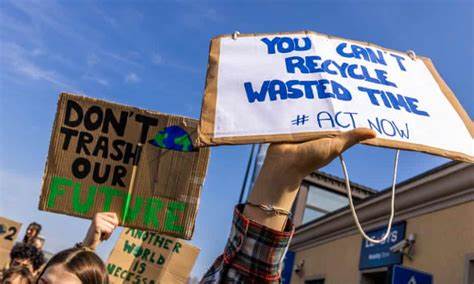11 Dec 2024

Tired Earth
By The Editorial Board

Reaching 1.5C of global heating is now pretty much inevitable, and we will reach it somewhere around 2035, no matter what we do. That’s the conclusion from the latest climate projections, which suggest even if we reach net zero emissions within the next 30 years, we will be stuck with at least that level of heating until 2070 or so.
“Staying below 1.5C of global warming is currently not plausible,” says Jochem Marotzke, from the Max Planck Institute for Meteorology in Hamburg, Germany.
The calculations, which are published in the journal Weather and are based on data from the recent Intergovernmental Panel on Climate Change (IPCC) report, plot future global heating relative to average temperature for the period 1850 to 1900. Starting in 2010, when the 20-year average global temperature (2001-20) was 0.99C above the baseline, the projections suggest the world could become anywhere between 1.4C and 4.4C hotter by 2090, depending on which emissions scenario we follow.
If emissions remain at their current high level then we can expect to reach 2C above pre-industrial levels by mid-century. But if emissions are reined in fast and reach net zero by about 2070 – the low emissions scenario – then we can be reasonably confident about avoiding 2C of heating.
However, burgeoning greenhouse emissions in recent decades mean that we have “baked in” at least 0.5C of heating between 2010 and 2045, even if we were to pull out all the stops and slash emissions as fast as possible.
There is still a slim chance of avoiding 1.5C of heating, but it can only happen if we follow the very low emissions scenario – whereby carbon dioxide emissions drop to zero within 30 years – and the climate system works in our favour.
“Sensitivity to carbon dioxide and warming resulting from historic emissions would have to be on the lower end of the uncertainty range,” says Marotzke.
And while stopping carbon dioxide emissions will enable us to stabilise global temperatures, we’ll need to stop all greenhouse gas emissions if we want to produce a decline in global temperature. “Some emissions like methane from agriculture are much harder to reduce,” says co-author Chris Jones from the Met Office Hadley Centre in Exeter, UK.
The impact of global heating is already being felt in the form of more intense and frequent extreme weather events. From the heatwave in Antarctica in recent weeks to catastrophic flooding across Europe last July, researchers are increasingly confident that many of the weather extremes being seen can be attributed to human greenhouse gas emissions.
Accepting that more heating and therefore even more intense and frequent extreme weather events are on the way makes mitigation measures more crucial than ever. “The risk from extreme weather increases substantially for the communities that are unable to protect themselves because of poverty,” says Marotzke. This is especially true for low-lying countries, who will have to deal with the impact of rising sea levels for centuries to come due to the ocean’s delayed response to global heating.
Some regions, such as Germany, have already experienced more than 1.5C of long-term heating and in the coming years the chances of any individual year passing the 1.5C mark will become increasingly likely.
“The latest forecasts show a 40% chance of temporarily exceeding 1.5C in the coming five years,” says Doug Smith from the Met Office.
But all is not lost. “There are certainly pathways which will achieve the goals of the Paris agreement, if governments choose to actively pursue them,” says Jones. He stresses that 1.5C and 2C of heating are not thresholds beyond which the world ends.
“Even if we miss 2C, for example, then achieving 2.5C is still viable and much better than 3C or 4C. The severity of impacts increases with warming level, but there is no real threshold between ‘safe’ and ‘dangerous’, just a gradual worsening,” he says. “The future is still in our hands and we can still avert the worst to come.”
Source : theguardian.com
Comment